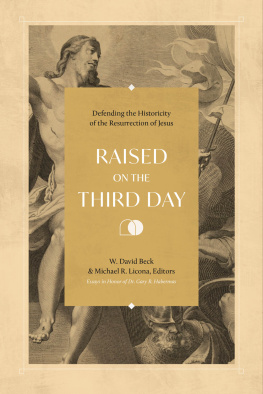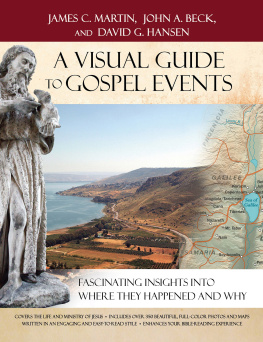Copyright 2017 Fortress Press. All rights reserved. Except for brief quotations in critical articles or reviews, no part of this book may be reproduced in any manner without prior written permission from the publisher. Email copyright@1517.media or write to Permissions, Fortress Press, PO Box 1209, Minneapolis, MN 55440-1209.
Cover image: Balazs Kovacs Images/Shutterstock.
Cover design: Brad Norr
The paper used in this publication meets the minimum requirements of American National Standard for Information Sciences Permanence of Paper for Printed Library Materials, ANSI Z329.48-1984.
Manufactured in the U.S.A.
2
Introduction: Welcoming the Stranger God
God, the Bible tells us, comes to us in strangers. And as Jim Morrison of the Doors sang, people are strange. Strangers, I guess, are especially sowhich makes it hard for us to welcome the stranger God.
If I may start with a strange story, let me tell you why the man in the cell next to Mr. Albert was drinking out of his toilet.
I tend to call Al Mr. Albert, because he is older than I am and Im a sucker for Southern manners. Ill add Mr. or Miss to your name if youre my senior. Mr. Albert has been in prison for a few decades, and hes been a longtime member of the Bible class I teach each week at the maximum-security French Robertson Unit just north of my hometown in Abilene, Texas. Ive been going out to the prison for over five years now, every Monday night.
Back when I was doing the chaplaincy training to get clearance to lead the Bible study, the head chaplain asked me why I wanted to come out to the prison.
Matthew 25, I answered, Jesus said wed find him disguised as a prisoner. So Im out here looking for Jesus.
This is a book about Matthew 25about how Jesus comes to us in disguise, in foreigners and refugees, in the homeless and the outcasts, in the prisoner and the hungry. This is a book about the strangeness of a God who comes to us in strangers. In the parable of the Sheep and the Goats, Jesus is disguised as the prisoner and the sick. In your life, Jesus might be disguised as the coworker at the watercooler or the Muslim woman standing next to you in the grocery store.
This is a book about the ancient Christian practice of hospitality, about encountering the God who surprises us in strangers. Do not forget to practice hospitality, the book of Hebrews entreats us, for some of us have entertained angels unawares.
True, the Men in White in the prison (inmates in Texas wear all white) and Mr. Albert are unlikely angels: Id never imagined angels could have that many tattoos. But over and over again, Jesus has kept his promise and come to me in the Men in White.
Which brings me back to Mr. Alberts story.
Al had been put into Ad Seg, which stands for Administrative Segregationits the jail within the prison, solitary, the hole. A prisoner is in a cell all by himself and cannot leave it for twenty-three hours of the day. Most of the men in Ad Seg are there because they are extraordinarily violent, but youre also sent to Ad Seg as punishment.
Mr. Albert sat alone in Ad Seg in a cell that had dried feces smeared on the walls. But what really was gnawing at him wasnt disgust or loneliness; it was the injustice that had befallen him. Al had been accused by the guards of something he didnt do, landing him in Ad Seg. So while Al sat in that disgusting cell, his hatred for the guards boiled and seethed.
As the days passed in Ad Seg, Al got to talking with the inmate in the cell next to his. The sink wasnt working in the mans cell, so when he grew thirsty, he had to drink the water out of the cells toilet. Many times, the man had asked for his sink to be repaired, but the guards didnt listen. So the man kept drinking out of the toilet.
Feeling sympathy for his fellow prisoner, Al would take a scrap of plastic and fill it with water from his sink. Hed then tie it off, making a small, improvised water balloon. Al would slide the balloon down the hallway toward the door of the mans cell. The man would reach out and grab the water balloons. Thanks to Al, he could drink the water from these water balloons rather than from the toilet.
Al eventually got out of Ad Seg, but his anger and hate for the guards lingered. A spiritual poison was seeping through his heart and soul.
And then things got worse.
Al received a call from his daughter. She was engaged, she announced, and the couple had set a date. While Al and his daughter rejoiced together, they also cried because Al couldnt be there to walk her down the aisle and give her away on her wedding day.
All this sent Al into a deeper spiritual pit. The injustice of his time in Ad Seg, the inability to walk his daughter down the aisleit was all too much.
On the day of the wedding, a guard approached Al. Come with me, the guard said. Al got up and followed.
The guard led Al to an office with a phone. You can pick it up, the guard said.
Al picked up the line and said hello.
The voice of his daughter answered.
The timing of the call had been arranged by the guards. Als daughter was standing at the back of the church, and the wedding march was about to play. The call had been organized so that Al could speak to his daughter right before she walked down the aisle.
Al had tears in his eyes at the Bible study one Monday night, when he shared this story of his journey through darkness into this unexpected moment of grace.
Satan will tell you lies, Al said, Lies that these guards are evil and that nothing good is in them. I believed those lies for a very long time. But Im here to tell you that there is good in everyone. The phone call with my daughter showed me that.
Over and over again, Jesus comes to us in disguise. Jesus comes to the man in Ad Seg as his neighbor slides him water balloons. Jesus comes to Mr. Albert in the guards who arrange the phone call with his daughter on her wedding day. Jesus comes to me everywhere in the testimony Al shared that night in our Bible study, in Als humanity to the man in Ad Seg, in the surprising act of kindness from the guards, in Als tear-filled testimony of confession, repentance, and forgiveness. I came to the prison looking for Jesus, and I found him.
Yet, over and over, we miss seeing Jesus. The very people Jesus names in Matthew 25the prisoner, the homeless, the hungryare named precisely because we dont see them. The parable of the Sheep and the Goats in Matthew 25 is a cautionary tale. In the parable, all of humanity stands before the judgment seat of God. God sends some to the left, the goats, and some to the right, the sheep. After the sorting, God says to the goats, Depart from me, you who are cursed, into the eternal fire prepared for the devil and his angels. For I was hungry and you gave me nothing to eat, I was thirsty and you gave me nothing to drink, I was a stranger and you did not invite me in, I needed clothes and you did not clothe me, I was sick and in prison and you did not look after me. Alarmed and confused, the goats exclaim, Lord, when did we see you hungry or thirsty or a stranger or needing clothes or sick or in prison, and did not help you? Jesuss response, in a nutshell: Everywhere. You saw me everywhere. I was standing right in front of you.










